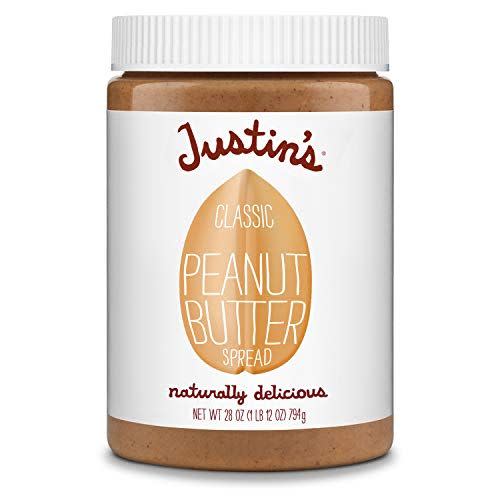Danielle Zickl
Updated ·5 min read
"Hearst Magazines and Yahoo may earn commission or revenue on some items through these links."
Peanut butter poses as a go-to fuel for workout, and probably a favorite food among many. And for good reason: You can slather it on burgers, mix it with ice cream, eat with a banana, spread it between two slices of bread, or spoon it up straight from the jar. But you might wonder if peanut butter calories are the kind that keep you pedaling strong and feeling your best.
There’s no question peanut butter tastes delicious. And chances are, you’ve heard it talked up for its protein and heart-healthy monounsaturated fats, too. So all that probably made you wonder: How many calories are in peanut butter—is your favorite, take-anywhere snack really good for you? And is peanut butter as protein-packed as you think?
To help us break down the nutrients and understand the calories of peanut butter, we chatted with Molly Kimball, R.D., sports dietitian with Ochsner Fitness Center in New Orleans.
Peanut Butter Calories Breakdown
One serving—or two (unsalted) tablespoons—of the popular nut butter contains the following:
191 calories
7 grams of protein
7 grams of carbs
16 grams of fat (13 grams of monounsaturated fat, 3 grams of saturated fat)
1.6 grams of fiber
3.4 grams of sugar
Carbs are your body’s main source of fuel—the glucose found in carbs turns into glycogen, which provides energy to your muscles, allowing you to ride harder and longer. Protein is important for building and maintaining muscle, and monounsaturated fats can help reduce your risk of heart disease and may even help you lose weight. (In fact, previous research has shown eating a diet high in healthy fat can actually help you lose weight and reduce your risk of cardiovascular disease.)
Peanut butter also has minerals that are essential to cyclists such as calcium, magnesium, phosphorus, and potassium. Calcium helps keep your bones and muscles strong, both magnesium and phosphorus help your muscles contract and also help convert the food you eat into energy that powers your rides, and potassium helps regulate your fluids, nerve signals, and muscle contractions.
While it’s clear that peanut butter has many nutritional benefits, “there’s a misconception people have that it’s high in protein,” Kimball says. It actually contains far more body-smart fats than protein and carbs.
In order for a food to be considered high in protein, it should contain at least 15 grams of protein. So if you do want to use peanut butter as a good protein source, you would need to double up your serving size to four tablespoons. That being said, two servings would add up to nearly 400 calories—which isn’t always necessarily a bad thing, according to Kimball.
“You have to look at how much bang for your buck you’re getting,” she says. “Some people could use the extra calories in their diets, but others might not want them. It all depends on your goals.”
Still, when you’re considering how to fit peanut butter calories into your eating plan, it’s probably best to have it filling the role of heart-healthy fat—not a protein source. Sure, peanut butter will give you some protein, but that’s the minority of its nutrients. If you’re looking for a straight-up protein source, you are better off with options like egg whites or Greek yogurt, which have way more protein than any other macronutrient.
Take 100 calories worth of egg whites (seven large whites) for example: They contain 25 grams of protein, 0 grams of fat, and 2 grams of carbs. One tablespoon of peanut butter—which clocks in at 96 calories—provides just 3.5 grams of protein, 8 grams of fat, and 3.5 grams of carbs.
But just because peanut butter is not the protein powerhouse you may have thought doesn’t mean you should skip it. In fact, it’s just the opposite.
“Peanut butter is one of my favorite snacks for cyclists,” she says. “There are only so many gels you want to eat, so eating something like a peanut butter fold-over is a nice change.”
The combination of being high in fat with a hit of protein, carbs, and fiber makes peanut butter super satiating and helps stave off hunger for a while—perfect for a long ride. So really just think of peanut butter calories as a scoop of perfection for those long rides.
Just make sure you’re choosing natural peanut butter brands, which contain minimal ingredients (peanuts and salt, ideally) and no added sugar, Kimball cautions.
A pro tip? Since peanut butter is relatively low in sodium—especially since some natural kinds contain no added salt—you may need to add some salt to it if you are eating it by itself as a fuel source, according to Kimball. Eating a peanut butter fold-over, like Kimball suggests, would be a more balanced option, since the bread will provide you with the sodium you need.
The bottom line? While it’s not a must-have in your diet—there are plenty of other ways to get your daily dose of heart-healthy fats—peanut butter is convenient, portable, and tasty. What more could you ask for, really?
You Might Also Like
